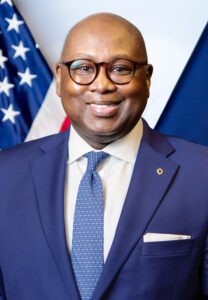
Rodney E. Hood, Acting Comptroller of the Currency for the Office of the Comptroller of the Currency (OCC), recently closed out the month of June, National Homeownership Month, with an address before the Detroit REACh Homebuyers Fair.
Hood, named Acting Comptroller of the Currency on February 10, 2025, is the administrator of the federal banking system and CEO of the OCC. The OCC ensures that the federal banking system operates in a safe manner, provides fair access to financial services, treats customers fairly, and complies with applicable laws and regulations. The OCC supervises more than 1,000 national banks, federal savings associations, and federal branches and agencies of foreign banks that serve consumers, businesses, and communities across the United States. These institutions range from community banks to the nation’s largest most internationally active banks.
Hood also serves as a Director of the Federal Deposit Insurance Corporation (FDIC) and a member of the Financial Stability Oversight Council (FSOC) and the Federal Financial Institutions Examination Council (FFIEC). Hood was previously confirmed by the U.S. Senate in 2005, and again in 2019 to serve on the National Credit Union Administration Board (NCUA). In 2019, President Donald J. Trump designated him as Chairman of the NCUA Board, making Hood the first African American to lead a federal banking regulatory agency. While at the NCUA, Hood also served as a voting member of the FSOC, as the NeighborWorks America Board Chair, and as Vice Chair of the FFIEC.
Prior to entering public service, Hood held senior roles in retail finance, commercial banking, affordable housing, and community development in the private sector.
“June is National Homeownership Month, a time to recognize the vital role that homeownership plays in building stronger communities, expanding access to economic opportunity, and empowering individuals and families through financial stability and generational wealth,” said Hood during his opening remarks. “This important gathering serves as a testament to our shared commitment to advancing homeownership.”
Hood noted that the work of the OCC, with banks both large and small, is driven by a continued dedication to financial inclusion.
“This is a priority that I hold in the highest regard,” added Hood. “OCC examiners supervise more than 1,000 national banks and federal savings associations that collectively hold nearly $16 trillion (with a “T”) in assets. These institutions represent two-thirds of the U.S. banking system and play a significant role in supporting individual and household financial health, entrepreneurship, and broad-based economic growth. The institutions we supervise range from the largest publicly traded global, corporate stock institutions to smaller member-owned mutual institutions. Every single one of these institutions has an opportunity—indeed I would call it an imperative—to advance the objectives of financial inclusion and to positively affect unbanked and underbanked individuals by bringing them into the banking mainstream.”
One of the OCC’s initiatives, Project REACh (the Roundtable for Economic Access and Change), leverages the OCC’s convening authority to bring together leaders from the banking industry, community organizations, businesses, and technology sectors. Through collaboration and partnership, these stakeholders develop innovative solutions aimed at dismantling the structural barriers that prevent full, equal, and fair participation in the nation’s economy.
“Financial inclusion is a cornerstone of economic empowerment. It ensures that individuals and communities have access to the financial tools and resources necessary to build wealth, invest in education, start businesses, and, importantly, achieve homeownership,” noted Hood. “Homeownership, as many of you know, is not merely about possessing property; it is about establishing roots, fostering community stability, and creating opportunities for generational wealth.”
The OCC established Project REACh in July 2020 to bring together stakeholders with the ability to help reduce inherent and structural obstacles, so underserved populations have the same opportunities as others to succeed and benefit from the nation’s financial system.
“Generational wealth, or the assets passed down from one generation to the next, plays a pivotal role in breaking the cycle of poverty and building economic resilience,” explained Hood. “Homeownership has historically been one of the most effective vehicles for accumulating and transferring this wealth. However, economic barriers have long prevented many people from accessing homeownership opportunities, thereby hindering their ability to build and sustain wealth over generations.”
Hood described the strides Project REACh has made to establish generational wealth through homeownership, by expanding affordable housing options, growing small business opportunities, supporting localized financial inclusion solutions, and leveraging fintech for financial empowerment.
“Project REACh has already delivered results—including expanding credit for those with no credit score, increasing investment in minority depository institutions, and tackling the challenges that limit full and fair economic participation,” stated Hood. “One of the critical areas of focus for Project REACh is affordable homeownership. By addressing the challenges that disadvantaged and underserved consumers face in purchasing homes, and by encouraging the development of innovative products and services that improve access to credit, REACh members strive to make homeownership attainable. This endeavor is not just about increasing homeownership rates; it is about ensuring that the dream of owning a home, and the benefits of stability and wealth creation, are accessible to every individual, regardless of their background or economic status.”
He outlined a number of Project REACh initiatives expanding affordable homeownership, including downpayment assistance programs and innovative mortgage products tailored to help first-time homebuyers.
“Additionally, member organizations are enhancing homebuyer counseling so that prospective homeowners can successfully navigate a complicated process,” Hood explained. “By fostering meaningful partnerships and encouraging creative problem-solving, Project REACh can empower more Americans to achieve homeownership and build generational wealth.”
Click here for more on the OCC’s Project REACh program.





